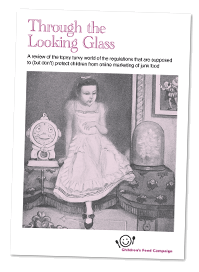News • Children's Food Campaign
Advertising Standards Authority still failing to protect children
 Children's Food Campaign launch Through the Looking Glass, a report examining the topsy turvy world of the regulations that are supposed to (but don’t) protect children from online marketing of junk food.
Children's Food Campaign launch Through the Looking Glass, a report examining the topsy turvy world of the regulations that are supposed to (but don’t) protect children from online marketing of junk food.
- Review exposes major failings in the regulator’s complaints process and in the non-broadcast marketing code.
- Communications Minister Ed Vaizey’s claims of “strict rules” and complaints “taken seriously” do not withstand public scrutiny.
- Campaigners calling for consistent and effective statutory regulations.
The Children’s Food Campaign today launches a report that examines the topsy turvy world of the regulations that are supposed to (but don’t) protect children from online marketing of junk food. The Through the Looking Glass report finds that, two years on from extending the non-broadcast advertising rules to cover websites and social media, the Advertising Standards Authority (ASA) is struggling to get to grips with its new role and is failing. Food companies continue to exploit loopholes and advertise junk foods to children online, even though stronger broadcasting regulations prevent such advertising on children’s television.
The report describes the ASA’s frustrating and time-consuming complaints process, following the submission of multiple complaints which sought to hold companies to account for their exploitative marketing practices. The Campaign found the regulator’s approach to be inconsistent, secretive, biased towards companies with the money and time to challenge rulings, and focused on the letter rather than the spirit of the Code. Moreover, the final rulings suggest that the ASA does not properly understand the digital world.
The investigation found that the weakness of the Committee of Advertising Practice (CAP) Code is at the root of the problem. This leads the ASA to accept junk food sites directly appealing to children that:
- host TV adverts promoting junk food that would not be allowed on children’s television;
- feature child-friendly brand characters;
- use advergames that encourage children to eat junk food;
- make misleading health or nutrition claims on sugary products.
Malcolm Clark, co-ordinator of the Children’s Food Campaign, said:
“The ASA and CAP act like Tweedledum and Tweedledee: ineffective, ridiculous and joined at the hip. But this is no laughing matter. Now more than ever, parents could use a strong helping hand in dealing with the online world and protecting their children from commercial interests. The ASA has proved itself unwilling and unable to fulfil this role.”
“In industry after industry – from MPs’ expenses, to phone-hacking, to banks, and now in online marketing – self-regulation has proven to be a failed model. More of the same is not what is needed to protect children’s health or to give parents more help in making healthy choices for their family.”
“In the meantime, those on the ASA Council and CAP Committees have to step up and improve the performance of their organisations. They should heed the report’s findings as they conduct their own official two year review of the online remit extension.”
Notes:
- Copies of the Through the Looking Glass report can be downloaded here.
- A copy of the report will be sent to the UK Minister for Culture, Communications and Creative Industries Ed Vaizey MP so he can judge whether he still stands by his correspondence to us of December 2011. In that letter he assured us that the ASA will take concerns of irresponsible food advertising seriously. He stated that the Authority encourages complaints to be lodged where advertising rules are believed to have been broken.
- In December 2011 the British Heart Foundation and the Children’s Food Campaign published The 21st Century Gingerbread house: How companies are marketing junk food to children online. The report revealed the manipulative tactics junk food manufacturers use to hook children while they play online, enticing them to eat more fatty, sugary or salty food. In February 2012 the Children’s Food Campaign submitted a ‘super-complaint’ to the ASA concerning the online marketing of products high in fat, salt and/or sugar to children. The ASA took no action at that stage.
- In April 2012 the Children’s Food Campaign submitted 27 further detailed complaints to the ASA about those websites we believed to be the worst offenders. Out of 27 complaints submitted:18 were rejected outright by the ASA.9 were investigated: 4 investigated complaints were not upheld; 2 investigated claims were informally resolved; 2 complaints were partially upheld; 1 is still awaiting final ruling (almost a year after the complaint was made), as the manufacturer objected to the initial draft ruling.
- The worst offenders, which were the subject of our complaints to the ASA, included the websites for: Vimto; Fanta; Nesquik; Chewits; Haribo; Swizzles Matlow sweets; Crème Eggs; M&Ms; Sugar Puffs; Rice Krispies; Oreos; Babybel; Nutella; Harvest Chewee bars; Twister icecreams. The complete list of complaints and websites can be found in Chapter 2 of the report.
- Children’s Food Campaign’s recommendations, as outlined in the Through the Looking Glass report, are:
(i) That the UK Government introduces consistent and effective statutory regulations across all broadcast and non-broadcast forms of marketing to protect children under 16 from the marketing of unhealthy food and drink products, as defined by the current FSA/Ofcom nutrient profiling model.
Pending such regulations there should be a radical overhaul of both the ASA’s complaints procedure and the CAP Code so that the system offers at least the same level of protection for children provided by the broadcasting regulations.
(ii) That the Advertising Standards Authority:
- Improves its complaints procedures to provide a level playing field between citizens and industry, including by helping individual complainants and by increasing the amount of independent expert advice sought before making a ruling.
- Toughens up its enforcement by using sanctions such as fines, and corrections that are as prominent as the misleading advert, which serve as a deterrent.
- Opens its compliance and informal resolution processes to public scrutiny.
- Regularly convenes a parents’ jury and children’s panel to judge what is and isn’t appropriate; and what appeals to and/or is targeted at children.
(iii) That the Committee of Advertising Practice:
- Strengthens rules governing non-broadcast advertising of unhealthy food to children so that they offer at least the same level of protection provided by the broadcast regulations (BCAP Code).
- Closes the loophole allowing products outlawed from children’s television to be marketed to young people online.
- Introduces the FSA/Ofcom Nutrient Profiling model for health and nutrition claims.
- Changes the composition of the Committees that write and advise on the CAP Code to increase the representation of organisations working in the public interest and which are free from commercial vested interests.
Published Monday 29 April 2013
Children's Food Campaign: Better food and food teaching for children in schools, and protection of children from junk food marketing are the aims of Sustain's high-profile Children's Food Campaign. We also want clear food labelling that can be understood by everyone, including children.





